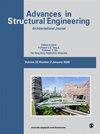齿轮箱轴承故障的多故障智能识别与分类
IF 2
4区 工程技术
引用次数: 0
摘要
齿轮箱系统中的轴承故障给工业运行带来了严峻挑战,需要先进的诊断技术来及时准确地识别。在本文中,我们提出了一种新的混合方法,用于自动分类和识别具有相同旋转频率的齿轮箱系统中的故障轴承。该方法采用了三种不同的信号处理方法,即集合经验模态分解 EEMD、小波包变换 WPT 和经验小波变换 EWT,成功地分割了信号并捕获了特定的频率成分以进行更深入的分析。通过使用 WPT 将振动信号分解为离散的频带,在时域中从每个子频带中提取相关特征,从而捕捉到不同频率范围内的不同故障特征。然后将这组广泛的特征作为机器学习算法的输入,以识别和分类变速箱系统中的故障轴承。随机森林 RF、决策树 DT 和集合树 ET 分类器在对不同故障类型及其定位进行分类时显示出显著的准确性。新方法以最低的准确率(Min = 99.95 %)和更高的稳定性(标准偏差 = 0.1)显示了诊断变速箱的高性能。本文章由计算机程序翻译,如有差异,请以英文原文为准。
Intelligent multi-fault identification and classification of defective bearings in gearbox
Bearing faults in gearbox systems pose critical challenges to industrial operations, needing advanced diagnostic techniques for timely and accurate identification. In this paper, we propose a new hybrid method for automated classification and identification of defective bearings in gearbox systems with identical rotating frequencies. The method successfully segmented the signals and captured specific frequency components for deeper analysis employing three distinct signal processing approaches, ensemble empirical mode decomposition EEMD, wavelet packet transform WPT, empirical wavelet transform EWT. By decomposing vibration signals into discrete frequency bands using WPT, relevant features were extracted from each sub-band in the time domain, enabling the capturing of distinct fault characteristics across various frequency ranges. This extensive set of features is then served as inputs for machine learning algorithm in order to identify and classify the defective bearing in the gearbox system. Random forest RF, decision tree DT, ensemble tree ET classifiers showcased a notable accuracy in classifying different fault types and their localizations. The new approach shows the high performance of the diagnostic gearbox with a minimum of accuracy (Min = 99.95 %) and higher stability (standard deviation = 0.1).
求助全文
通过发布文献求助,成功后即可免费获取论文全文。
去求助
来源期刊

Advances in Mechanical Engineering
Engineering-Mechanical Engineering
自引率
4.80%
发文量
353
期刊介绍:
Advances in Mechanical Engineering (AIME) is a JCR Ranked, peer-reviewed, open access journal which publishes a wide range of original research and review articles. The journal Editorial Board welcomes manuscripts in both fundamental and applied research areas, and encourages submissions which contribute novel and innovative insights to the field of mechanical engineering
 求助内容:
求助内容: 应助结果提醒方式:
应助结果提醒方式:


